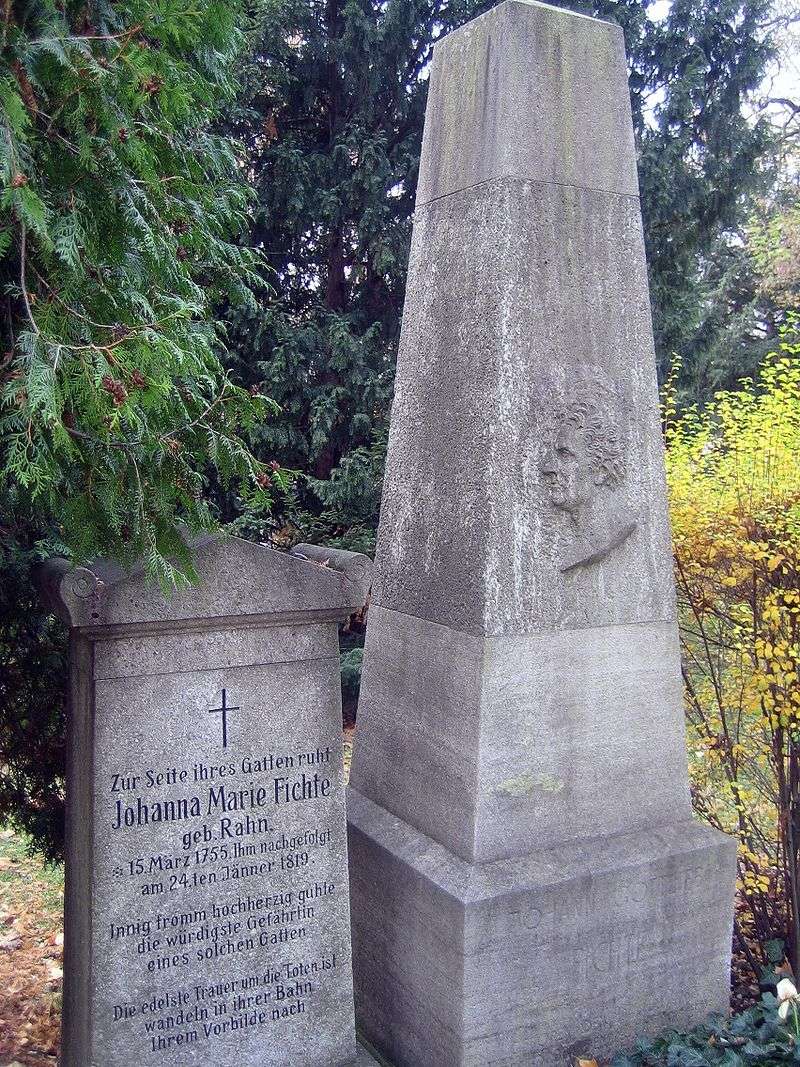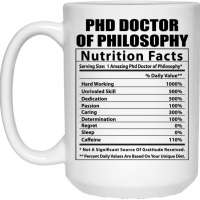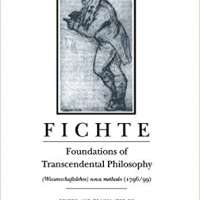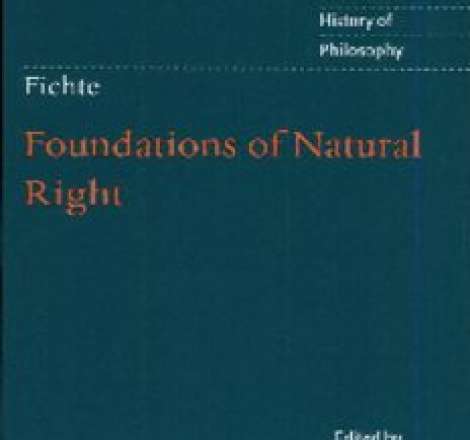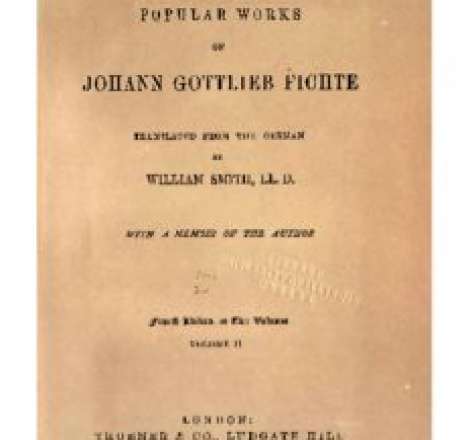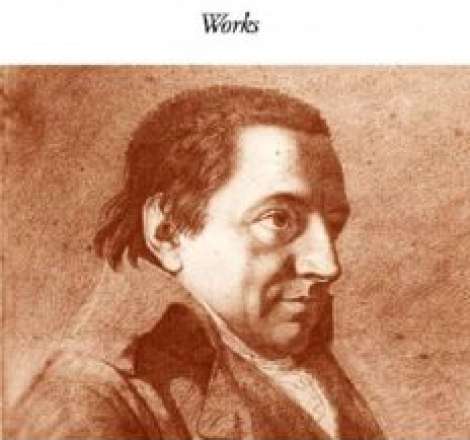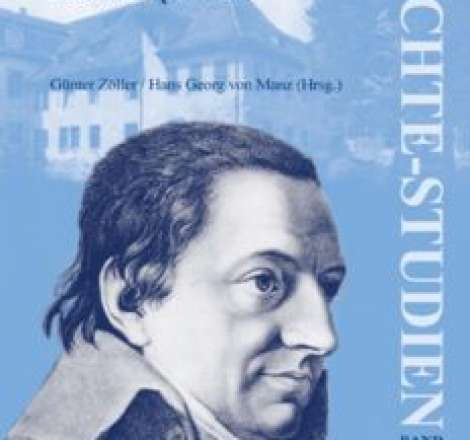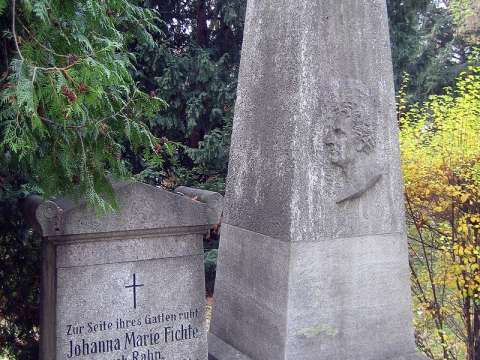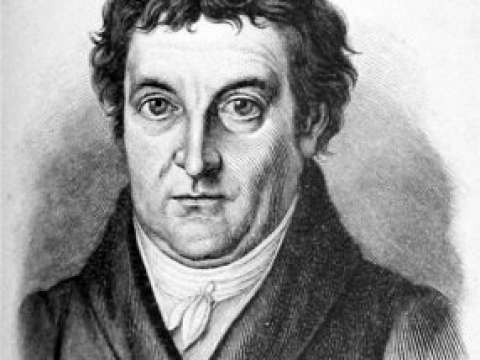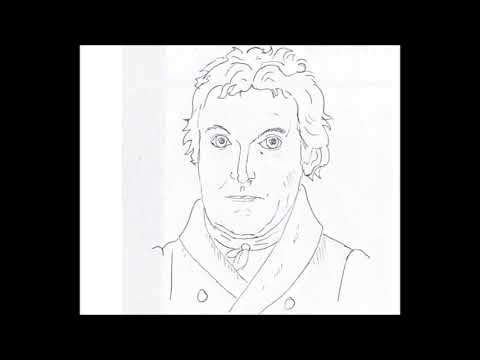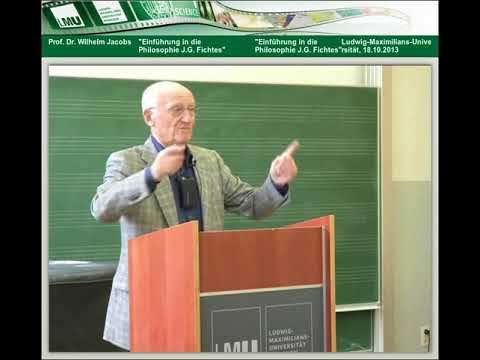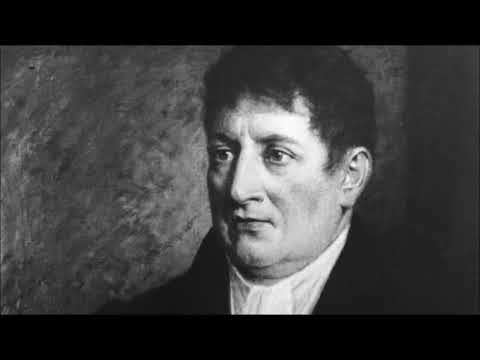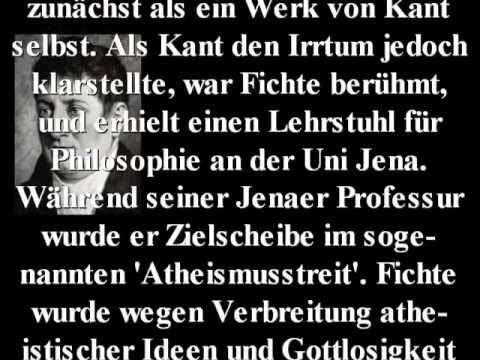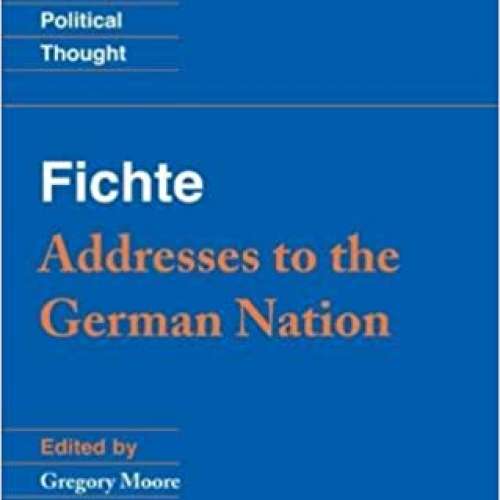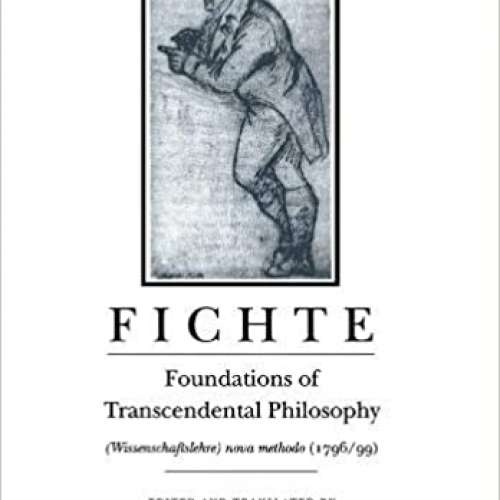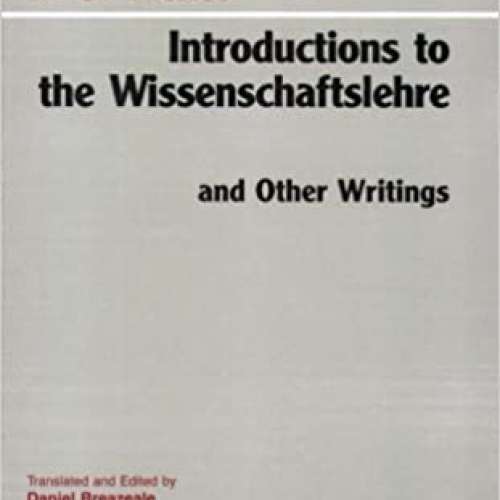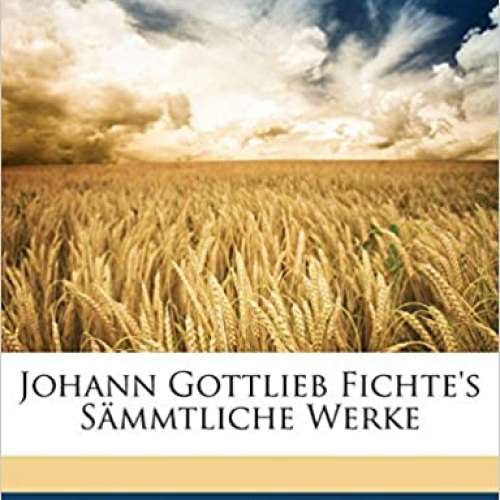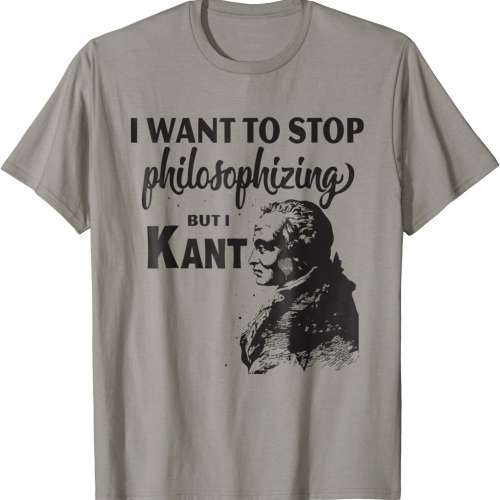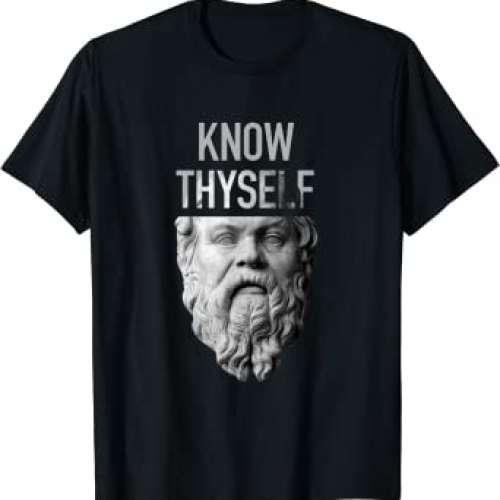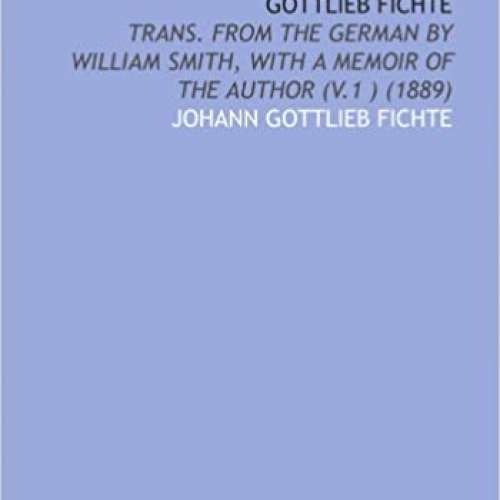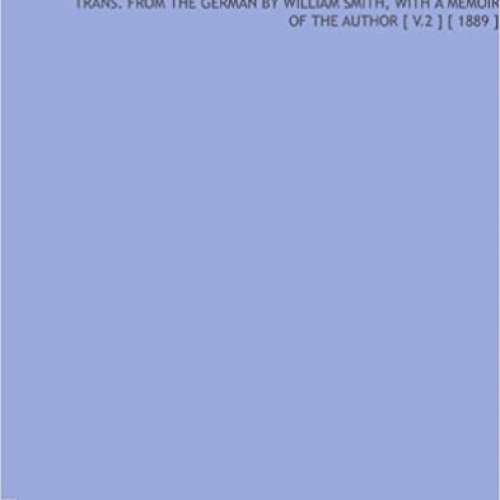

Johann Gottlieb Fichte (1762-1814)

A man can do what he ought to do; and when he says he cannot, it is because he will not.
Johann Gottlieb Fichte was a German philosopher who became a founding figure of the philosophical movement known as German idealism, which developed from the theoretical and ethical writings of Immanuel Kant. Recently, philosophers and scholars have begun to appreciate Fichte as an important philosopher in his own right due to his original insights into the nature of self-consciousness or self-awareness. Fichte was also the originator of thesis–antithesis–synthesis, an idea that is often erroneously attributed to Hegel. Like Descartes and Kant before him, Fichte was motivated by the problem of subjectivity and consciousness. Fichte also wrote works of political philosophy; he has a reputation as one of the fathers of German nationalism.
Biography
Origins
Fichte was born in Rammenau, Upper Lusatia. The son of a ribbon weaver, he came of peasant stock which had lived in the region for many generations. The family was noted in the neighborhood for its probity and piety. Christian Fichte, Johann Gottlieb's father, married somewhat above his station. It has been suggested that a certain impatience which Fichte himself displayed throughout his life was an inheritance from his mother.
He received a rudimentary education from his father. He showed remarkable ability from an early age, and it was owing to his reputation among the villagers that he gained the opportunity for a better education than he otherwise would have received. The story runs that the Freiherr von Militz, a country landowner, arrived too late to hear the local pastor preach. He was, however, informed that a lad in the neighborhood would be able to repeat the sermon almost verbatim. As a result, the baron took Fichte into his protection and paid for his tuition.
Early schooling
Fichte was placed in the family of Pastor Krebel at Niederau near Meissen, and there received a thorough grounding in the classics. From this time onward, Fichte saw little of his parents. In October 1774, he attended the celebrated foundation-school at Pforta near Naumburg. This school is associated with the names of Novalis, August Wilhelm Schlegel, Friedrich Schlegel and Nietzsche. The spirit of the institution was semi-monastic and, while the education was excellent, it is doubtful whether there was enough social life and contact with the world for Fichte's temperament and antecedents. Perhaps his education strengthened a tendency toward introspection and independence, characteristics which appear strongly in his doctrines and writings.
Theological studies and private tutoring
In 1780, Fichte began study at the University of Jena's theology seminary. He was transferred a year later to study at the Leipzig University. Fichte seems to have supported himself during this period of bitter poverty and hard struggle. Freiherr von Militz continued to support him, but when he died in 1784, Fichte had to end his studies without completing his degree.
From 1784 to 1788, Fichte precariously supported himself as tutor for various Saxon families. In early 1788, he returned to Leipzig in the hope of finding a better employment, but eventually he had to settle for a less promising position with the family of an innkeeper in Zurich. He lived in Zurich for the next two years 1788–1790, which was a time of great contentment for him. There he met his future wife, Johanna Rahn, and Johann Heinrich Pestalozzi. He also became, in 1793, a member of the Freemasonry lodge "Modestia cum Libertate" with which Johann Wolfgang Goethe was also connected. In the spring of 1790, he became engaged to Johanna. Fichte began to study the works of Kant in the summer of 1790. This occurred initially because one of Fichte's students wanted to know about Kant's writings. They had a lasting effect on his life and thought. However, while Fichte was studying Kantian philosophy, the Rahn family suffered financial reverses. His impending marriage had to be postponed.
Kant
From Zurich, Fichte returned to Leipzig in May 1790. In the spring of 1791, he obtained a tutorship in Warsaw in the house of a Polish nobleman. The situation, however, quickly proved disagreeable and he was released. He then got a chance to see Kant at Königsberg. After a disappointing interview on July 4 of the same year, he shut himself in his lodgings and threw all his energies into the composition of an essay which would attract Kant's attention and interest. This essay, completed in five weeks, was the Versuch einer Critik aller Offenbarung Attempt at a Critique of All Revelation, 1792. In this book, according to Henrich, Fichte investigated the connections between divine revelation and Kant's critical philosophy. The first edition was published without Kant's or Fichte's knowledge and without Fichte's name or signed preface. It was thus believed by the public to be a new work by Kant.
When Kant cleared the confusion and openly praised the work and author, Fichte's reputation skyrocketed. In a letter to Karl Reinhold, Jens Baggeson wrote that it was "...the most shocking and astonishing news... nobody but Kant could have written this book. This amazing news of a third sun in the philosophical heavens has set me into such confusion". Kant waited seven years to make public statement about the incident; after considerable external pressure he dissociated himself from Fichte. In his statement, he inscribed, "May God protect us from our friends. From our enemies, we can try to protect ourselves."
Jena
In October 1793, Fichte was married in Zurich, where he remained the rest of the year. Stirred by the events and principles of the French Revolution, he wrote and anonymously published two pamphlets which led to him to be seen as a devoted defender of liberty of thought and action and an advocate of political changes. In December of the same year, he received an invitation to fill the position of extraordinary professor of philosophy at the University of Jena. He accepted and began his lectures in May 1794. With extraordinary zeal, he expounded his system of "transcendental idealism". His success was immediate. He excelled as a lecturer due to the earnestness and force of his personality. These lectures were later published under the title The Vocation of the Scholar Einige Vorlesungen über die Bestimmung des Gelehrten. He gave himself up to intense production, and a succession of works soon appeared.
Atheism dispute
After weathering several academic storms, Fichte was finally dismissed from the University of Jena in 1799 for atheism. He had been accused of this in 1798 after publishing the essay "Ueber den Grund unsers Glaubens an eine göttliche Weltregierung" "On the Ground of Our Belief in a Divine World-Governance", written in response to Friedrich Karl Forberg's essay "Development of the Concept of Religion", in his Philosophical Journal. For Fichte, God should be conceived primarily in moral terms: "The living and efficaciously acting moral order is itself God. We require no other God, nor can we grasp any other" "On the Ground of Our Belief in a Divine World-Governance". Fichte's intemperate "Appeal to the Public" "Appellation an das Publikum", 1799 provoked F. H. Jacobi to publish an open letter in which he equated philosophy in general and Fichte's transcendental philosophy in particular with nihilism.
Berlin
Since all the German states except Prussia had joined in the cry against Fichte, he was forced to go to Berlin. There he associated himself with the Schlegels, Schleiermacher, Schelling and Tieck. In April 1800, through the introduction of Hungarian writer Ignaz Aurelius Fessler, he was initiated into Freemasonry in the Lodge Pythagoras of the Blazing Star where he was elected minor warden. At first Fichte was a warm admirer of Fessler, and was disposed to aid him in his proposed Masonic reform. But later he became Fessler's bitter opponent. Their controversy attracted much attention among Freemasons. Fichte presented two lectures on the philosophy of Masonry during the same period as part of his work on the development of various higher degrees for the lodge in Berlin. Johann Karl Christian Fischer, a high official of the Grand Orient, published those lectures in 1802/03 in two volumes under the title Philosophy of Freemasonry: Letters to Konstant Philosophie der Maurerei. Briefe an Konstant, where Konstant referred to a fictitious non-Mason.
In November 1800, Fichte published The Closed Commercial State: A Philosophical Sketch as an Appendix to the Doctrine of Right and an Example of a Future Politics Der geschlossene Handelsstaat. Ein philosophischer Entwurf als Anhang zur Rechtslehre und Probe einer künftig zu liefernden Politik, a philosophical statement of his property theory, a historical analysis of European economic relations, and a political proposal for reforming them. In 1805, he was appointed to a professorship at the University of Erlangen. The Battle of Jena-Auerstedt in 1806, in which Napoleon completely crushed the Prussian army, drove him to Königsberg for a time, but he returned to Berlin in 1807 and continued his literary activity.
After the collapse of the Holy Roman Empire, where German southern principalities resigned as member states and became part of a French protectorship, Fichte delivered the famous Addresses to the German Nation Reden an die deutsche Nation, 1807-1808 which attempted to define the German Nation, and guided the uprising against Napoleon. He became a professor at the new University of Berlin, founded in 1810. By the votes of his colleagues Fichte was unanimously elected its rector in the succeeding year. But, once more, his impetuosity and reforming zeal led to friction, and he resigned in 1812. The campaign against Napoleon began, and the hospitals at Berlin were soon full of patients. Fichte's wife devoted herself to nursing and caught a virulent fever. Just as she was recovering, he himself was stricken down. He died of typhus in 1814 at the age of 51.
His son, Immanuel Hermann Fichte 18 July 1796 – 8 August 1879, also made contributions to philosophy.
Philosophical work
Fichte's critics argued that his mimicry of Kant's difficult style produced works that were barely intelligible. "He made no hesitation in pluming himself on his great skill in the shadowy and obscure, by often remarking to his pupils, that 'there was only one man in the world who could fully understand his writings; and even he was often at a loss to seize upon his real meaning.'" On the other hand, Fichte acknowledged the difficulty, but argued that his works were clear and transparent to those who made the effort to think without preconceptions and prejudices.
Fichte did not endorse Kant's argument for the existence of noumena, of "things in themselves", the supra-sensible reality beyond direct human perception. Fichte saw the rigorous and systematic separation of "things in themselves" noumena and things "as they appear to us" phenomena as an invitation to skepticism. Rather than invite skepticism, Fichte made the radical suggestion that we should throw out the notion of a noumenal world and accept that consciousness does not have a grounding in a so-called "real world". In fact, Fichte achieved fame for originating the argument that consciousness is not grounded in anything outside of itself. The phenomenal world as such, arises from self-consciousness; the activity of the ego; and moral awareness. His student and critic, Arthur Schopenhauer, wrote:
Fichte who, because the thing-in-itself had just been discredited, at once prepared a system without any thing-in-itself. Consequently, he rejected the assumption of anything that was not through and through merely our representation, and therefore let the knowing subject be all in all or at any rate produce everything from its own resources. For this purpose, he at once did away with the essential and most meritorious part of the Kantian doctrine, the distinction between a priori and a posteriori and thus that between the phenomenon and the thing-in-itself. For he declared everything to be a priori, naturally without any evidence for such a monstrous assertion; instead of these, he gave sophisms and even crazy sham demonstrations whose absurdity was concealed under the mask of profundity and of the incomprehensibility ostensibly arising therefrom. Moreover, he appealed boldly and openly to intellectual intuition, that is, really to inspiration.
Søren Kierkegaard was also a student of the writings of Fichte:
Our whole age is imbued with a formal striving. This is what led us to disregard congeniality and to emphasize symmetrical beauty, to prefer conventional rather than sincere social relations. It is this whole striving which is denoted by — to use the words of another author — Fichte's and the other philosophers' attempts to construct systems by sharpness of mind and Robespierre's attempt to do it with the help of the guillotine; it is this which meets us in the flowing butterfly verses of our poets and in Auber's music, and finally, it is this which produces the many revolutions in the political world. I agree perfectly with this whole effort to cling to form, insofar as it continues to be the medium through which we have the idea, but it should not be forgotten that it is the idea which should determine the form, not the form which determines the idea. We should keep in mind that life is not something abstract but something extremely individual. We should not forget that, for example, from a poetic genius' position of immediacy, form is nothing but the coming into existence of the idea in the world, and that the task of reflection is only to investigate whether or not the idea has gotten the properly corresponding form. Form is not the basis of life, but life is the basis of form. Imagine that a man long infatuated with the Greek mode of life had acquired the means to arrange for a building in the Greek style and a Grecian household establishment — whether or not he would be satisfied would be highly problematical, or would he soon prefer another form simply because he had not sufficiently tested himself and the system in which he lived. But just as a leap backward is wrong (something the age, on the whole, is inclined to acknowledge), so also a leap forward is wrong — both of them because a natural development does not proceed by leaps, and life's earnestness will ironize over every such experiment, even if it succeeds momentarily.
Central theory
In Foundations of Natural Right 1797, Fichte argued that self-consciousness was a social phenomenon — an important step and perhaps the first clear step taken in this direction by modern philosophy. For Fichte, a necessary condition of every subject's self-awareness is the existence of other rational subjects. These others call or summon fordern auf the subject or self out of its unconsciousness and into an awareness of itself as a free individual.
Fichte proceeds from the general principle that the I das Ich must posit itself as an individual in order to posit setzen itself at all, and that in order to posit itself as an individual, it must recognize itself to a calling or summons Aufforderung by other free individuals — called to limit its own freedom out of respect for the freedom of the others. The same condition applies to the others in development. Mutual recognition gegenseitig anerkennen of rational individuals is a condition necessary for the individual I. The argument for intersubjectivity is central to the conception of selfhood developed in the Foundations of the Science of Knowledge Grundlage der gesamten Wissenschaftslehre, 1794/1795.
Fichte's consciousness of the self depends upon resistance or a check by something that is understood as not part of the self yet is not immediately ascribable to a particular sensory perception. In his later 1796–99 lectures his Nova methodo, Fichte incorporated this into his revised presentation of the foundations of his system, where the summons takes its place alongside original feeling, which takes the place of the earlier Anstoss see below as a limit on the absolute freedom and a condition for the positing of the I.
The I posits this situation for itself. To posit does not mean to 'create' the objects of consciousness. The principle in question simply states that the essence of an I lies in the assertion of self-identity, i.e., that consciousness presupposes self-consciousness. Such immediate self-identity cannot be understood as a psychological fact, or an act or accident of some previously existing substance or being. It is an action of the I, but one that is identical with the very existence of this same I. In Fichte's technical terminology, the original unity of self-consciousness is an action and the product of the same I, as a "fact and/or act" Thathandlung; Modern German: Tathandlung, a unity that is presupposed by and contained within every fact and every act of empirical consciousness, although it never appears as such.
The I can posit itself only as limited. Moreover, it cannot even posit its own limitations, in the sense of producing or creating these limits. The finite I cannot be the ground of its own passivity. Instead, for Fichte, if the I is to posit itself, it must simply discover itself to be limited, a discovery that Fichte characterizes as an "impulse," "repulse," or "resistance" Anstoss; Modern German: Anstoß to the free practical activity of the I. Such an original limitation of the I is, however, a limit for the I only insofar as the I posits it out as a limit. The I does this, according to Fichte's analysis, by positing its own limitation, first, as only a feeling, then as a sensation, then as an intuition of a thing, and finally as a summons of another person.
The Anstoss thus provides the essential impetus that first posits in motion the entire complex train of activities that finally result in our conscious experience both of ourselves and others as empirical individuals and of the world around us. Although Anstoss plays a similar role as the thing in itself does in Kantian philosophy, unlike Kant, Fichte's Anstoss is not something foreign to the I. Instead, it denotes the original encounter of the I with its own finitude. Rather than claim that the not-I das Nicht-Ich is the cause or ground of the Anstoss, Fichte argues that not-I is posited by the I in order to explain to itself the Anstoss in order to become conscious of Anstoss. The Wissenschaftslehre demonstrates that Anstoss must occur if self-consciousness is to come about but is unable to explain the actual occurrence of Anstoss. There are limits to what can be expected from an a priori deduction of experience, and this, for Fichte, equally applies to Kant's transcendental philosophy.
Dieter Henrich 1966 proposed that Fichte was able to move beyond a "reflective theory of consciousness". According to Fichte, the self must already have some prior acquaintance with itself, independent of the act of reflection "no object comes to consciousness except under the condition that I am aware of myself, the conscious subject ". This idea is what Henrich called Fichte's original insight.
Nationalism
Between December 1807 and March 1808, Fichte gave a series of lectures concerning the "German nation" and its culture and language, projecting the kind of national education he hoped would raise it from the humiliation of its defeat at the hands of the French. Having been a supporter of Revolutionary France, Fichte became disenchanted by 1804 as Napoleon's armies advanced through Europe, occupying German territories, stripping them of their raw materials and subjugating them to foreign rule. He came to believe Germany would be responsible to carry the virtues of the French Revolution into the future. Furthermore, his nationalism was not aroused by Prussian military defeat and humiliation, for these had not yet occurred, but resulted from his own humanitarian philosophy. Disappointed in the French, he turned to the German nation as the instrument of fulfilling it.
These lectures, entitled the Addresses to the German Nation, coincided with a period of reform in the Prussian government, under the chancellorship of Baron vom Stein. The Addresses display Fichte's interest during that period in language and culture as vehicles of human spiritual development. Fichte built upon earlier ideas of Johann Gottfried Herder and attempted to unite them with his approach. The aim of the German nation, according to Fichte, was to "found an empire of spirit and reason, and to annihilate completely the crude physical force that rules of the world." Like Herder's German nationalism, Fichte's was cultural, and grounded in the aesthetic, literary, and moral.
The nationalism propounded by Fichte in the Addresses would be used over a century later by the Nazi Party in Germany, which saw in Fichte a forerunner to its own nationalist ideology. Like Nietzsche, the association of Fichte with the Nazi regime came to colour readings of Fichte's German nationalism in the post-war period. This reading of Fichte was often bolstered through reference to an unpublished letter from 1793, Contributions to the Correction of the Public's Judgment concerning the French Revolution, wherein Fichte expressed anti-semitic sentiments, such as arguing against extending civil rights to Jews and calling them a "state within a state" that could "undermine" the German nation.
However, attached to the letter is a footnote in which Fichte provides an impassioned plea for permitting Jews to practice their religion without hindrance. Furthermore, the final act of Fichte's academic career was to resign as rector of the University of Berlin in protest when his colleagues refused to punish the harassment of Jewish students. While recent scholarship has sought to dissociate Fichte's writings on nationalism with their adoption by the Nazi Party, the association continues to blight his legacy, although Fichte, as if to exclude all ground of doubt, clearly and distinctly prohibits, in his reworked version of The Science of Ethics as Based on the Science of Knowledge see § Final period in Berlin genocide and other crimes against humanity:
Women
Fichte believed that "active citizenship, civic freedom and even property rights should be withheld from women, whose calling was to subject themselves utterly to the authority of their fathers and husbands."
Final period in Berlin
Fichte gave a wide range of public and private lectures in Berlin from the last decade of his life. These form some of his best known work, and are the basis of a revived German-speaking scholarly interest in his work.
The lectures include two works from 1806. In The Characteristics of the Present Age Die Grundzüge des gegenwärtigen Zeitalters, Fichte outlines his theory of different historical and cultural epochs. His mystic work The Way Towards the Blessed Life Die Anweisung zum seligen Leben oder auch die Religionslehre gave his fullest thoughts on religion. In 1807-1808 he gave a series of speeches in French-occupied Berlin, Addresses to the German Nation.

In 1810, the new University of Berlin was established, designed along ideas put forward by Wilhelm von Humboldt. Fichte was made its rector and also the first Chair of Philosophy. This was in part because of educational themes in the Addresses, and in part because of his earlier work at Jena University.
Fichte lectured on further versions of his Wissenschaftslehre. Of these, he only published a brief work from 1810, The Science of Knowledge in its General Outline Die Wissenschaftslehre, in ihrem allgemeinen Umrisse dargestellt; also translated as Outline of the Doctrine of Knowledge. His son published some of these thirty years after his death. Most only became public in the last decades of the twentieth century, in his collected works. This included reworked versions of the Doctrine of Science Wissenschaftslehre, 1810–1813, The Science of Rights Das System der Rechtslehre, 1812, and The Science of Ethics as Based on the Science of Knowledge Das System der Sittenlehre nach den Principien der Wissenschaftslehre, 1812; 1st ed. 1798.
Bibliography
Selected works in German
Wissenschaftslehre
- Ueber den Begriff der Wissenschaftslehre oder der sogenannten Philosophie 1794
- Grundlage der gesamten Wissenschaftslehre 1794/1795
- Wissenschaftslehre nova methodo 1796–1799: "Halle Nachschrift," 1796/1797 and "Krause Nachschrift," 1798/1799
- Versuch einer neuen Darstellung der Wissenschaftslehre 1797/1798
- Darstellung der Wissenschaftslehre 1801
- Die Wissenschaftslehre 1804, 1812, 1813
- Die Wissenschaftslehre, in ihrem allgemeinen Umrisse dargestellt 1810
Other works in German
- Versuch einer Critik aller Offenbarung 1792
- Beitrag zur Berichtigung der Urteile des Publikums über die französische Revolution 1793
- Einige Vorlesungen über die Bestimmung des Gelehrten 1794
- Grundlage des Naturrechts 1796
- Das System der Sittenlehre nach den Principien der Wissenschaftslehre 1798
- "Ueber den Grund unsers Glaubens an eine göttliche Weltregierung" 1798
- "Appellation an das Publikum über die durch Churf. Sächs. Confiscationsrescript ihm beigemessenen atheistischen Aeußerungen. Eine Schrift, die man zu lesen bittet, ehe man sie confsicirt" 1799
- Der geschlossene Handelsstaat. Ein philosophischer Entwurf als Anhang zur Rechtslehre und Probe einer künftig zu liefernden Politik 1800
- Die Bestimmung des Menschen 1800
- Friedrich Nicolais Leben und sonderbare Meinungen 1801
- Philosophie der Maurerei. Briefe an Konstant 1802/03
- Die Grundzüge des gegenwärtigen Zeitalters 1806
- Die Anweisung zum seligen Leben oder auch die Religionslehre 1806
- Reden an die deutsche Nation 1807/1808
- Das System der Rechtslehre 1812
Correspondence
- Jacobi an Fichte, German Text 1799/1816, with Introduction and Critical Apparatus by Marco Ivaldo and Ariberto Acerbi Introduction, German Text, Italian Translation, 3 Appendices with Jacobi's and Fichte's complementary Texts, Philological Notes, Commentary, Bibliography, Index: Istituto Italiano per gli Studi Filosofici Press, Naples 2011, ISBN 978-88-905957-5-2.
Collected works in German
The new standard edition of Fichte's works in German, which supersedes all previous editions, is the Gesamtausgabe "Collected Works" or "Complete Edition", commonly abbreviated as GA, prepared by the Bavarian Academy of Sciences: Gesamtausgabe der Bayerischen Akademie der Wissenschaften, 42 volumes, edited by Reinhard Lauth , Hans Gliwitzky, Erich Fuchs and Peter Schneider, Stuttgart-Bad Cannstatt: Frommann-Holzboog, 1962–2012.
It is organized into four parts:
- Part I: Published Works
- Part II: Unpublished Writings
- Part III: Correspondence
- Part IV: Lecture Transcripts
Fichte's works are quoted and cited from GA, followed by a combination of Roman and Arabic numbers, indicating the series and volume, respectively, and the page numbers. Another edition is Johann Gottlieb Fichtes sämmtliche Werke abbrev. SW, ed. I. H. Fichte. Berlin: de Gruyter, 1971.
Selected works in English
- Concerning the Conception of the Science of Knowledge Generally Ueber den Begriff der Wissenschaftslehre oder der sogenannten Philosophie, 1794, translated by Adolph Ernst Kroeger. In The Science of Knowledge, pp. 331–336. Philadelphia: J.B. Lippincott & Co., 1868. Rpt., London: Trübner & Co., 1889.
- Attempt at a Critique of All Revelation. Trans. Garrett Green. New York: Cambridge University Press, 1978. Translation of Versuch einer Critik aller Offenbarung, 1st ed. 1792, 2nd ed. 1793.
- Early Philosophical Writings. Trans. and ed. Daniel Breazeale. Ithaca: Cornell University Press, 1988. Contains Selections from Fichte's Writings and Correspondence from the Jena period, 1794–1799.
- Foundations of the Entire Science of Knowledge. Translation of: Grundlage der gesammten Wissenschaftslehre 1794/95, 2nd ed. 1802, Fichte's first major exposition of the Wissenschaftlehre. In: Heath, Peter; Lachs, John, eds. 1982. The Science of Knowledge. With the First and Second Introductions reissued; first published by Meredith Corporation 1970. Texts in German Philosophy. Translated by Heath, Peter; Lachs, John. Cambridge University Press. ISBN 978-0-521-27050-2.
- Foundations of Natural Right. Trans. Michael Baur. Ed. Frederick Neuhouser. Cambridge: Cambridge University Press, 2000. Translation of Grundlage des Naturrechts, 1796/97.
- Foundations of Transcendental Philosophy Wissenschaftslehre Nova Methodo [FTP]. Trans. and ed. Daniel Breazeale. Ithaca, NY: Cornell University Press, 1992. Translation of Wissenschaftslehre nova methodo, 1796–1799.
- The System of Ethics according to the Principles of the Wissenschaftslehre translation of Das System der Sittenlehre nach den Principien der Wissenschaftslehre, 1798. Ed. and trans. Daniel Breazeale and Günter Zöller. Cambridge University Press, 2005.
- Introductions to the Wissenschaftslehre and Other Writings. Trans. and ed. Daniel Breazeale. Indianapolis, and Cambridge: Hackett, 1994. Contains mostly writings from the late Jena period, 1797–1799.
- The Vocation of Man, 1848. Trans. Peter Preuss. Indianapolis. Translation of Die Bestimmung des Menschen, 1800.
- The Vocation of the Scholar, 1847. Translation of Einige Vorlesungen über die Bestimmung des Gelehrten, 1794.
- The Closed Commercial State: J G Fichte with an interpretive essay by the translator, and with a German-English glossary. SUNY series in Contemporary Continental Philosophy. Translated by Adler, Anthony Curtis. Albany, New York: State University of New York Press. 2013. ISBN 978-1-4384-4021-7.
- A Crystal Clear Report to the General Public Concerning the Actual Essence of the Newest Philosophy: An Attempt to Force the Reader to Understand. Trans. John Botterman and William Rash. In: Philosophy of German Idealism, pp. 39–115. Translation of Sonnenklarer Bericht an das grössere Publikum über das Wesen der neuesten Philosophie, 1801.
- The Science of Knowing: J.G. Fichte's 1804 Lectures on the Wissenschaftslehre with an introduction by the translator and a German-English glossary. SUNY series in Contemporary Continental Philosophy. Translated by Wright, Walter E. Albany, New York: State University of New York Press. 2005. ISBN 978-0-7914-6449-6.
- Outline of the Doctrine of Knowledge, 1810 Translation of Die Wissenschaftslehre, in ihrem allgemeinen Umrisse dargestellt published in From The Popular Works of Johann Gottlieb Fichte, Trubner and Co., 1889; trans. William Smith.
- On the Nature of the Scholar, 1845 Translation of Ueber das Wesen des Gelehrten, 1806.
- Characteristics of the Present Age Die Grundzüge des gegenwärtigen Zeitalters, 1806. In: The Popular Works of Johann Gottlieb Fichte, 2 vols., trans. and ed. William Smith. London: Chapman, 1848/49. Reprint, London: Thoemmes Press, 1999.
- Addresses to the German Nation Reden an die deutsche Nation, 1808, ed. and trans. Gregory Moore. Cambridge University Press, 2008.
- The Philosophical Rupture Between Fichte and Schelling: Selected Texts and Correspondence 1800-1802. Trans. and eds. Michael G. Vater and David W. Wood. Albany, NY: State University of New York Press, 2012. Includes the following texts by Johann Gottlieb Fichte: Correspondence with F.W.J. Schelling 1800–1802; "Announcement" 1800; extract from "New Version of the Wissenschaftslehre" 1800; "Commentaries on Schelling's System of Transcendental Idealism and Presentation of My System of Philosophy" 1800–1801.
Works online in English
- J.G. Fichte. "The Wissenschaftslehre is Mathematics" "Announcement", 1800/1801. *
- Addresses to the German Nation 1922. Trs. R. F. Jones and G. H. Turnbull. IA UToronto
- The Destination of Man 1846. Alternative translation of The Vocation of Man. Tr. Mrs. Percy Sinnett. IA UToronto
- Doctrine de la science Paris, 1843. French translation of Foundations of the Entire Science of Knowledge. Google Harvard Google Oxford Google UMich in French
- Johann Gottlieb Fichte’s Popular Works 1873. Tr. William Smith. IA UToronto
- New Exposition of the Science of Knowledge 1869. Translation of Versuch einer neuen Darstellung der Wissenschaftslehre. Tr. A. E. Kroeger. Google Harvard Google NYPL IA UToronto
- On the Nature of the Scholar 1845. Alternative translation of The Vocation of the Scholar. Tr. William Smith. IA UToronto
- The Popular Works of Johann Gottlieb Fichte 1848–49. Tr. William Smith. Volume 1, 1848. Google Oxford IA UToronto 4th ed., 1889. IA UIllinois IA UToronto Volume 2, 1849. IA UToronto 4th ed., 1889. Google Stanford IA UIllinois IA UToronto
- Volume 1, 1848. Google Oxford IA UToronto 4th ed., 1889. IA UIllinois IA UToronto
- Volume 2, 1849. IA UToronto 4th ed., 1889. Google Stanford IA UIllinois IA UToronto
- The Science of Ethics as Based on the Science of Knowledge 1897. Tr. A. E. Kroeger. Google UMich IA UToronto
- The Science of Knowledge 1889. Alternative translation of Foundations of the Entire Science of Knowledge. Tr. A. E. Kroeger. IA UToronto
- The Science of Rights 1889. Tr. A. E. Kroeger. IA UCal
- German Versuch einer Critik aller Offenbarung Königsberg, 1792; 2nd ed. 1793. Gallica Google Oxford Google Oxford
- The Vocation of Man 1848. Tr. William Smith. Google Oxford 1910. Google UCal
- The Vocation of the Scholar 1847. Tr. William Smith. IA UCal
- The Way Towards the Blessed Life 1849. Tr. William Smith. Google Oxford
- "On the Foundation of Our Belief in a Divine Government of the Universe"; alternative translation of "On the Ground of Our Belief in a Divine World-Governance" trans. anon. n.d..
More facts
Fichte: Addresses to the German Nation
Fichte: Foundations of Transcendental Philosophy
Introductions to the Wissenschaftslehre and Other Writings
Johann Gottlieb Fichte's Sämmtliche Werke
Prinz Louis Ferdinand (1927)

